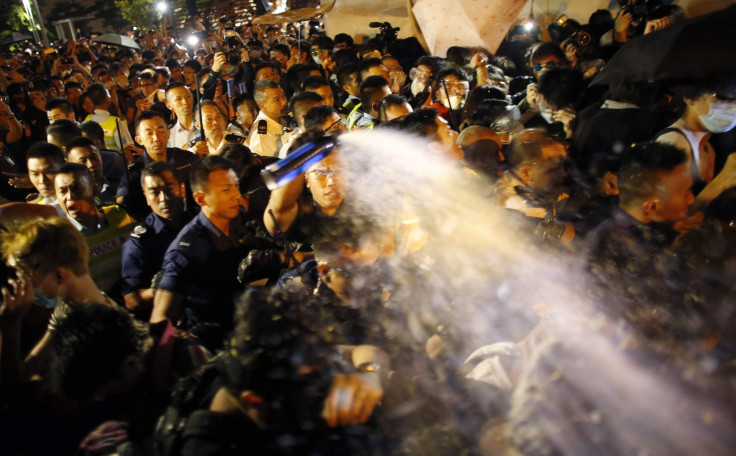Tear Gas Fired Inside Hong Kong Rail Station As Violence Rages; Draws Ire Of Rail Operator

Anti-police sentiment is sure to rise after tear gas was fired inside a Hong Kong railway station Sunday evening by the Hong Kong Police force in response to demonstrators throwing objects, committing acts of vandalism and mis-using fire extinguishers.
By morning the trains were running as normal but there was some evidence of the rioting still visible in the station.
White powder was visible on the floors and columns outside the station had been converted into “Lennon Walls” with mosaic-like posting of messages on boards in support of the demonstrators.
Mass Transit Railway (MTR) issued a statement expressing regret for the safety of passengers and employees that had been subjected to tear gas and rubber bullets. MTR also expressed disdain for protestors who damaged the facilities and for the abuse of the fire extinguishers. The statement read, “Since there were passengers and MTR staff in the station, the actions and operation were threatening their safety. We have raised our concerns with the police and urged them to consider the safety of passengers and MTR staff during law enforcement.”
The protesters used tactics described as “hit-and-run” targeting police stations and blocking roads. When a mob headed toward another police station for another siege the police began firing tear gas inside and outside the Kwai Fong MTR station. Over 50 people were injured, at least two of them seriously.
Tear gas reacts with moisture on the skin and eyes causing a burning sensation and irritation to the eyes that can render a person blind. When inhaled, it will cause profuse coughing and a mucous filled discharge. In an open well-ventilated area, the chemical will disperse rapidly and cause no lingering effects. Prolonged exposure can cause damage to the heart, lungs and pulmonary system and should not be used in enclosed areas.
District council member Ng Kin-sing told the South China Morning Post, “According to police’s guidelines, tear gas should not be fired in indoor areas. We are also concerned about the expired tear gas fired by them.” He added, “Some scientists in Venezuela have said firing it indoors may produce fatal chemicals. I think there is a big issue with what the police did.”
Hong Kong is divided as to their support of the police. Most of the attention has gone to the protestors who understandably, would not be fond of uniformed police armed with tear gas and rubber bullets. Less attention has gone to some large-scale rallies in Hong Kong that have drawn very large crowds showing their support of the police.
© Copyright IBTimes 2024. All rights reserved.





















